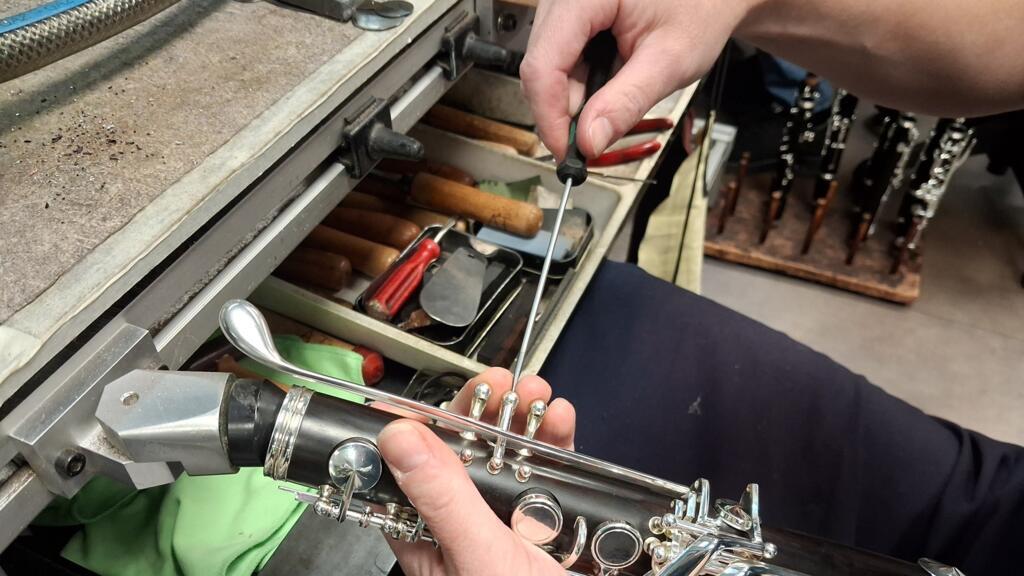
The United States has added a 15 percent tariff on European goods since August, and while wine, aerospace and luxury items have been among the hardest hit, French musical instrument makers are also struggling. The US is a key market, buying half of all musical instruments made worldwide.
At Buffet Crampon’s large workshop near Paris, 15,000 clarinets are produced each year. The majority are exported to the United States – "around 30 percent of our production," Jérôme Perrod, president of this 200-year-old company, told RFI.
But since the implementation of US tariffs on 7 August, things have changed.
"We’re already seeing a decline in the market due to price increases. Stores are being very cautious and don’t want to renew their stock, because they fear that musicians will buy fewer instruments," said Perrod.
The US market for wind instruments is shrinking because prices have gone up due to tariffs set by Donald Trump’s administration. According to Perrod, prices have increased by 10 to 15 percent.
US competition
Jakez François, CEO of Camac Harps, a pioneering French harp maker, shares the same concerns. The American market makes up a quarter of the company’s exports.
"These tariffs caused our prices to jump overnight," François explained. "And they come on top of the weak dollar against the euro. Combined, this has led to a 22 percent increase in our prices in the United States."
On 15 September, Camac faced a setback that had long been feared. "We had a shipping container with about 15 harps ready to go," said François. "Our main distributor cancelled more than half the order. We're now in the exact situation we were worried about."
It’s a significant blow, especially given that Camac’s main global competitor is based in the United States. "This puts us in a much tougher position against that competitor," François added.
Trump's tariffs come into force, upending economic ties with Europe
Buffet Crampon, however, is almost in a monopoly position on the wind instrument market. Because of this, Perrod says he doesn't understand the relevance behind these tariffs.
"We have no competitors in the United States, so no one is going to benefit from these American taxes."
Impact on education
The customs duties agreed between the EU and the Trump administration appear to be a lose-lose deal.
This is especially concerning since wind instruments have long been an important part of musical education and culture in the US.
"There is a very strong tradition of instrumental practice in the United States, particularly in orchestras, starting in school. Half of all children between 9 and 12 years old choose to play a wind instrument, which inevitably leads to a career in music for some of them," says Perrod.
In the long term, this tradition could suffer the consequences of these tariffs, explains Coraline Baroux-Desvignes, general delegate of the Chambre Syndicale de la Facture Instrumentale (CSFI), the union which represents around 60 companies in the sector.
"Some musicians may delay purchasing musical instruments until the situation improves, which could have an impact on the quality of musical productions," she said.
The price increase also impacts instruments made for students, which are more affordable.
"This could discourage young musicians from starting regular practice of an instrument," added Baroux-Desvignes, who fears the consequences for "several generations of musicians".
Partial unemployment
French instrument makers are now exploring new markets. The president of Camac Harps said he is working to grow the company's presence in parts of Asia, particularly China, Hong Kong and Singapore.
Buffet Crampon is thinking about doing the same. "But these new opportunities will probably not compensate for the decline in export volumes to the United States," said Perrod, as the US market buys half of all musical instruments made worldwide.
François says his company can manage for now, but Perrod has had to put some workers on partial unemployment to cut back on activity.
EU winemakers left exposed after missing US tariff exemption
"It breaks our hearts to see the workshops empty on some Fridays," he said.
According to him, this is the best option available. "It would take us years to re-train workers and get back to the quality we have today. Partial unemployment lets us keep our staff and when business picks up again, bring them back like before."
Perrod doesn’t believe the tariffs will be lifted anytime soon, but still hopes for an exemption from US taxes on wind instruments.
The US Supreme Court is due to rule in early November on whether the tariffs imposed by Trump on US trade partners are legal.
This article has been adapted from the original version in French.







